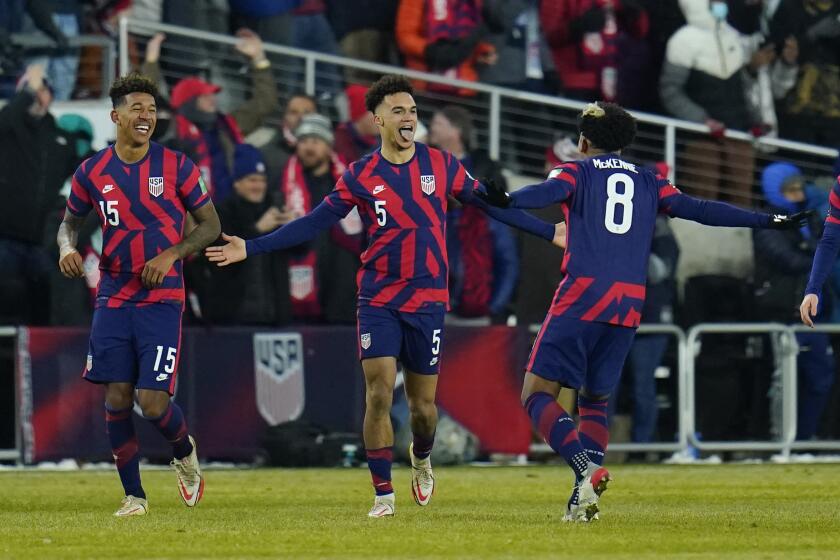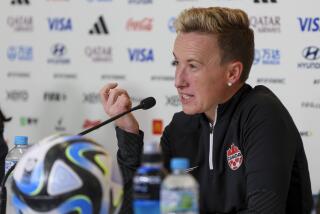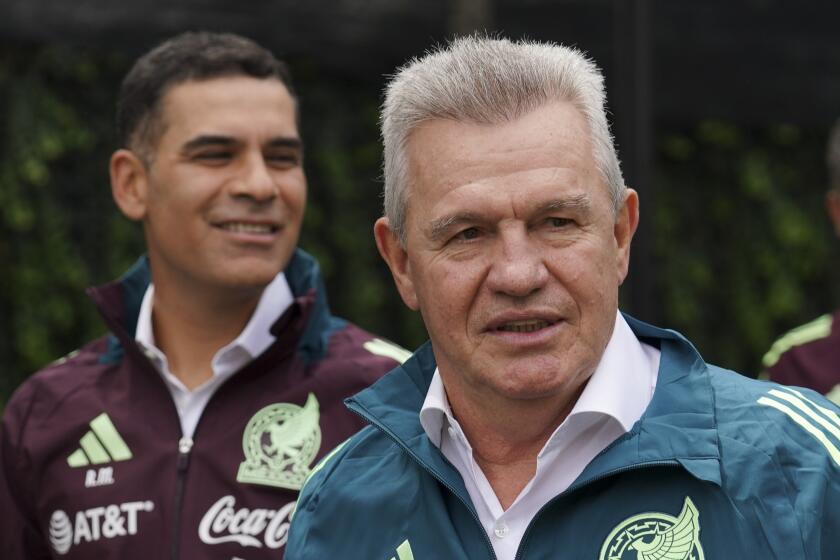Inside Alphonso Davies’ rise from African refugee to Canadian soccer game-changer
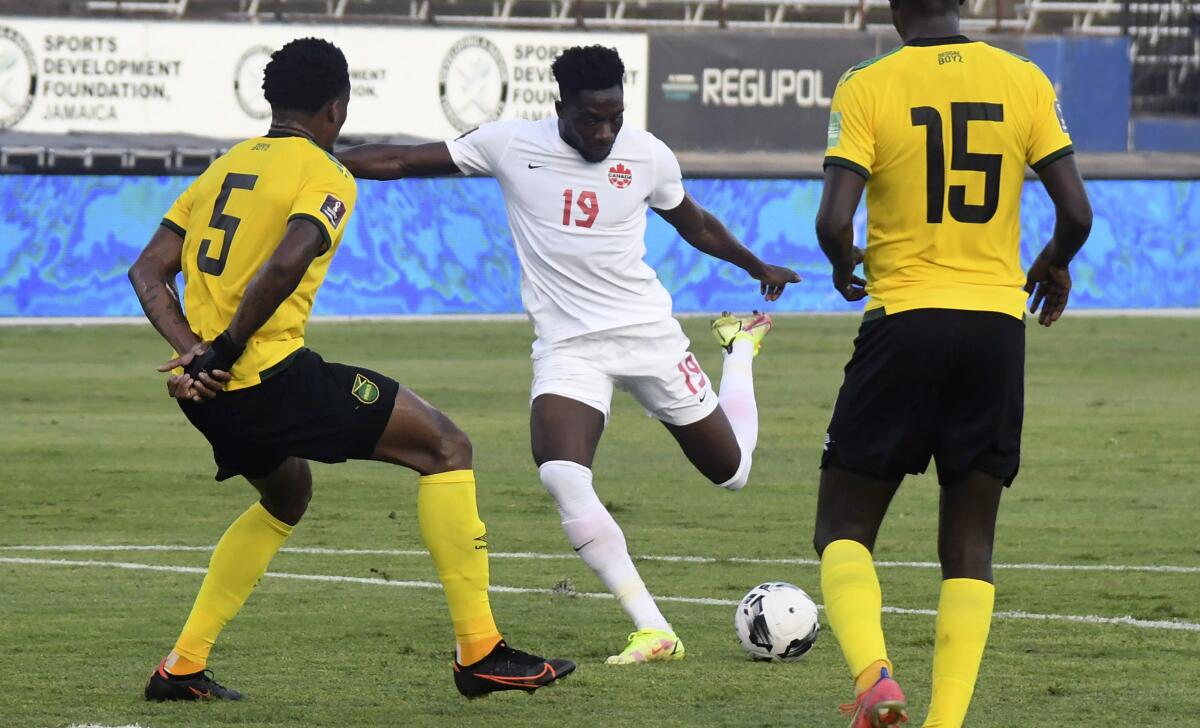
MINNEAPOLIS — Canada will play its most important men’s soccer game in nearly two generations Sunday. And its most important player will be watching on TV, half a world away.
Canada probably wouldn’t be undefeated and in first place two-thirds of the way through the CONCACAF World Cup qualifying tournament without Alphonso Davies, its dynamic 21-year-old winger. Without him, it certainly wouldn’t be ranked 40th in the world, which might sound modest but is the highest Canada has ever climbed in the FIFA poll.
So when it plays the second-place U.S. on Sunday on a frigid artificial-turf field about an hour southwest of Toronto, Davies will be missed.
“It’s a fight for the top of the table. That’s all I need to say in terms of what this means to us now,” Canada coach John Herdman said Saturday. “What an opportunity for these players. It’s World Cup qualifying, a massive game and you’re playing your biggest rival.”
Antonee Robinson’s goal early in the second half lifted the U.S. to a 1-0 victory over El Salvador, moving the Americans closer to returning to the World Cup.
But they’ll be playing without Davies who, after testing positive for COVID-19 earlier this month, was diagnosed with myocarditis, an inflammation of the heart linked closely to the coronavirus. He isn’t expected to resume training with his club team, Bayern Munich, until next month and won’t play again for Canada until at least March.
And that leaves a big hole in Herdman’s team because what Davies brings on the field is only a small part of what makes him integral to Canada’s success.
Davies was born in a sordid refugee camp in Ghana to parents who had fled their native Liberia during that country’s second civil war in 1999. When he was 5, Canada approved the family’s request to emigrate, and they eventually settled in Edmonton.
He has been trying to thank his adopted homeland ever since.
“There were only two opportunities: you either become part of the war or try to get out,” Davies, who was not made available for this story, said in a roundtable interview last year after being named a Global Goodwill Ambassador for the United Nations’ Refugee Agency. “Everything in the refugee camp was a battle. I can just visualize the smile on their faces knowing we were going to have a better life once we got accepted in the resettlement program to go to Canada.
“It was an amazing relief.”
After the MLS came to Canada, youth academies and a new domestic league sprouted to help build a foundation of change for the men’s national team.
His family isn’t alone. Davies, who became a citizen at 16, is one of five naturalized Canadians on the national team. Goalkeeper Milan Borjan, a Serb, fled the Croatian war of independence at 7 and was accepted into Canada five years later, becoming a citizen as a teen. Forward Jonathan David came from Haiti when he was 6; Iké Ugbo and Samuel Adekugbe were both born into Nigerian families in England.
Canada has relied heavily on that group: Borjan leads the qualifying tournament with four shutouts in nine games, David shares the team lead with four goals and Adekugbe has played in Canada’s last eight games, starting five.
And the soccer squad isn’t the only Canadian national team that has benefitted from the country’s big-hearted immigrant policies: Eight of the 38 ministers in Justin Trudeau’s cabinet are immigrants, among them Ahmed Hussen, the head of housing, diversity and inclusion who fled the Somali civil war as a teenager and sought asylum in Toronto, and Juan Rodríguez, minister of heritage and multiculturalism, who left his native Argentina when his house was bombed and his father tortured during that country’s “dirty war.”
Canada’s Refugee Resettlement Project, established in 1978 as part of the United Nations’ Operation Lifeline, has resettled nearly 300,000 refugees since Davies entered the country in 2005, making his family’s story emblematic of many.
“They came here, they lived in a small apartment. They worked hard, paid their bills and just survived,” said Nick Huoseh, who befriended Davies’ family shortly after it arrived in Edmonton.
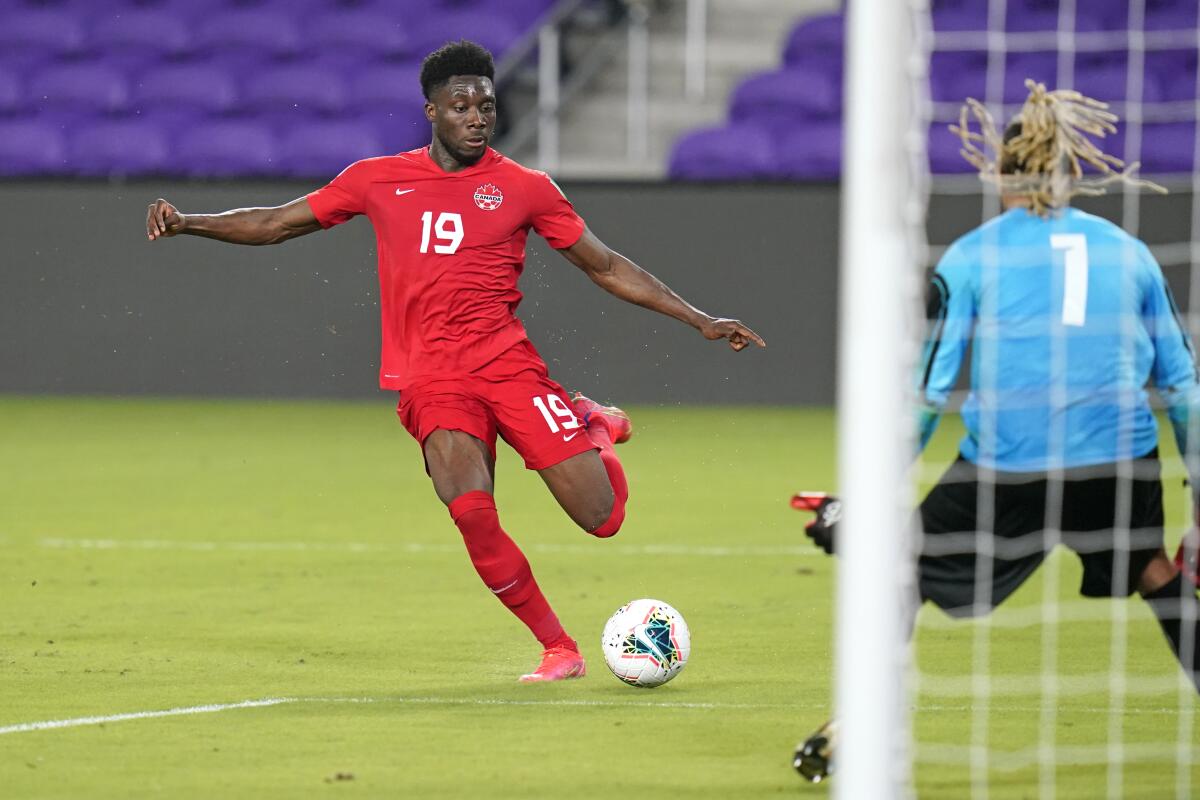
Huoseh, himself the son of Palestinian immigrants, coached Davies when he was in grade school, then became his agent when Davies turned professional at 15. He says what makes Davies arguably the best player in CONCACAF, the 41-team FIFA federation that comprises North America, Central America and the Caribbean, isn’t just his talent, but the chance to display it.
“I was speaking with a guy from Africa and he said there are many kids like Alphonso. The only problem is the opportunity is not there,” Huoseh said. “When you don’t have missiles and bombs falling out of the sky, then you can focus on being successful.
“The opportunities are here. You do what you want with them.”
Davies’ mother Victoria agrees.
“Canada has been good to refugees and we appreciate everything,” she said. “It’s easier to find opportunities to work, go to school or play sports when there is security. When you come from situations like ours, you have to learn how to survive.
“Alphonso doesn’t remember much [about Ghana], but we raised him to work hard in life.”
Davies went to school in the northeast Edmonton neighborhood of Beverly, where his soccer skills were apparent from the start, something that eased the transition for an African immigrant in a city that is less than 5% Black.
Now he’s a celebrity there, with nearly 60% of respondents to a recent online poll answering yes to the question of “Is Alphonso Davies the most famous Edmontonian ever?” (Apparently the voters forgot that Wayne Gretzky, who has a street in downtown Edmonton named after him, once lived there as well.)
“[He] was the hardest youth player to defend against in our city. He was strong, fast, quick and had that different type of flare to him. Forget the raw talent. Alphonso had a different type of work ethic, which was the difference between him and the rest of us.”
— Alphonso Davies’ childhood teammate Adam Huoseh
“He’s a generational player. He had that speed and talent that other kids were lacking,” Huoseh said of Davies. “So there is the gift.”
Huoseh’s son Adam played with a 10-year-old Davies on the Edmonton Strikers, a youth team his father coached. Because the Huosehs ferried Davies to games and practices, the two boys became fast friends.
“Alphonso was confident and quiet at the same time,” Adam said. “Alphonso was the only youth player that I knew was going to be up there with the greats.
“[He] was the hardest youth player to defend against in our city. He was strong, fast, quick and had that different type of flare to him. Forget the raw talent. Alphonso had a different type of work ethic, which was the difference between him and the rest of us.”
Adam Huoseh, now attending college and playing soccer in England, credits that to his friend’s upbringing.
“Alphonso never really talked about his background much or what his goals were, but we all knew — and he knew — that he wanted to make it to the top level and live a better life,” he said. “He didn’t talk about the past much, but it was something that made him hungrier to make it than others.“
That hunger fueled a rapid rise. At 15, Davies was playing in MLS with the Vancouver Whitecaps, becoming the third-youngest player in league history. Two years later, he moved to Europe on a $22-million transfer negotiated by Huoseh, an engineer by trade who, at the urging of Davies’ parents, sold his business to become their son’s agent.

With Bayern Munich, Davies has won 10 titles, including a Champions League crown, becoming the only Canadian to lift club soccer’s most important trophy.
The prize he really wants, though, is a World Cup invitation, something that was largely beyond Canada’s reach before Davies arrived. Consider the fact the country is playing in the final round of the CONCACAF qualifying tournament for the first time since Davies was born.
It won only one of 10 games and was outscored by 15 goals the last time it got this far, in 1998.
Only one player on Canada’s national team was alive the only time the country played in a World Cup. That was 1986, when the team was shut out in three straight losses.
A win over the U.S. on Sunday would virtually guarantee Canada a spot in this fall’s tournament in Qatar. And with the country hosting the 2026 World Cup alongside the U.S. and Mexico, Canada is already assured of playing in that competition.
For Davies and Canada, that stands as proof that a little opportunity can go a long way — an example that has become a motto for an underdog team now on the verge of history.
“He’s shown a lot of young people coming to this country that you can accomplish anything. ‘Look at me, I was born in a refugee camp and now I play for Bayern Munich,’ ” Huoseh said. “It gives people that sense of hope.
“You don’t necessarily have to be a football player. But you can accomplish your dream.”

